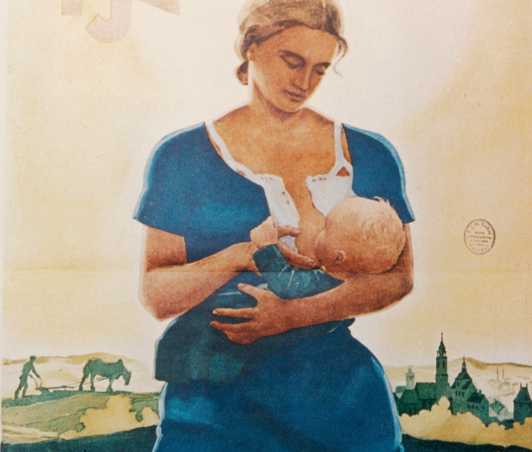The coming of the war meant an abrupt change in Nazi policy towards
Women. Their prime duty now was to assist the war effort:
• In September 1939, the month that the war started, a Land Year programme was introduced, a form of obligatory national service requiring unattached females to spend a year working on farms. It was no easy life. The farm camps were usually military-style barracks and the work could be unremittingly hard.
In what ways does Source Q present an idealized concept of Nazi womanhood?
• The pressure of war also obliged the Nazis to drop their opposition to women in the industrial workforce. In 1942 they began to encourage, even to demand, that women go into the factories. By the last full year of the war over half the industrial workers in Germany were women.
SOURCE
Nazi propaganda poster Mutter und Kind (Mother and Child).

IHuttec uno Sind
The war proved a great destroyer of social convention in Germany. The huge gaps that appeared in manpower as the lists of war dead lengthened could be filled in only one way: German women would have to produce children in such numbers that Germany's future could be secured. But the absence and death of so many husbands meant there were no longer enough married couples to fulfil this task. Himmler's answer was to appeal to women to make themselves pregnant outside the normal confines of marriage. He spoke of this as a 'sublime task'. The Ministry of Justice backed him by ruling in 1944 that the leaders of Germany's youth movements were acting wholly legally in urging the girls to have unmarried sex in order to 'donate a child to the Fuhrer'.
The reality was that the war had changed everything. The Nazis found it impossible to sustain their traditional policies towards women in the face of a war that ultimately destroyed German society.
How were Germany’s minorities treated under Nazism?




 World History
World History









